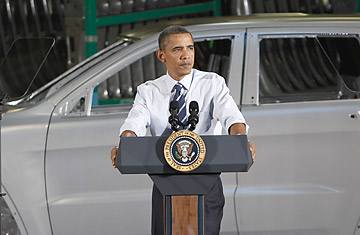
President Obama delivers a speech at the Chrysler Jefferson North Assembly Plant in Detroit
(2 of 2)
Yet Obama's approach to the cities has been a detached one, favoring a broadly palatable "metropolitan policy," which encourages cooperation between cities and suburbs. As he told the National Urban League's conference last week, his aim is to create "an economy that lifts up all Americans." Fair enough. One reason for Obama's treatment of cities is that he doesn't want to remind the vast suburban and rural swaths of the electorate that he's a former community organizer — urban having become code for problems involving blacks, Latinos and the poor. He avoids the appearance of favoritism toward black America and urban America as if it were the third rail of the subway.
It may turn out to be easier for a Southern white Democrat to deal with the particular concerns of cities than a black President elected from Chicago's South Side. It was LBJ, at the University of Michigan in May 1964, who spelled out his Great Society agenda. "Our society will never be great until our cities are great," he said. "Today the frontier of imagination is inside those cities and not beyond their borders."
Yet if there's anyone who could give cities the tough love they need, it's Obama. He already has their votes. The way many old-school cities are run, especially Detroit, they are ripe for change. Bing is trying to do that, but moral support from the White House would go a long way.
Detroit may be the best — and trickiest — place to dispel the myth that cities are resistant to change. It's a symbol of American failure, and thus a potential icon of American resilience. Here's what Obama could do: First, push a series of investments specifically for cities that commit to significant, sustainable government restructuring. Some of that is already under way in Detroit. Second, put money toward innovative education projects like public boarding schools, which have proven successful in Washington and Baltimore. Next, make significant investments in crime-prevention programs, in some cases turning neighborhoods into militarized zones. It wouldn't be popular, but it would send a powerful signal in Detroit and beyond.
For these measures to work, cities must do their part. Detroit, in particular, must cast aside the nativism that threatens innovation. But Detroit's needs must be a higher priority in the White House. The consequences of failing to deal with our cities' challenges are too great. For this country, nation building should begin at home.
